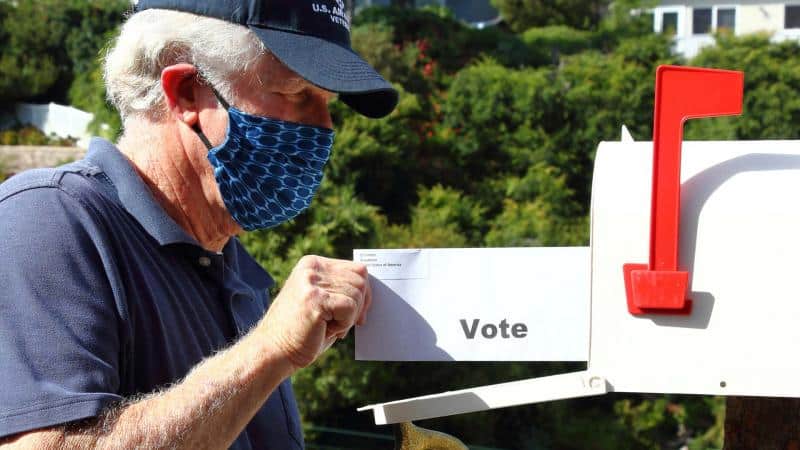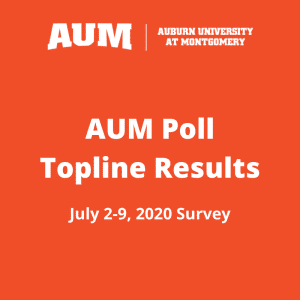AUM Poll finds Alabamians overwhelmingly favor face masks, safer voting measures during COVID-19 pandemic

With the general election fewer than five months away and COVID-19 cases rising in Alabama, a new Auburn University at Montgomery poll indicates the vast majority of Alabamians support wearing face masks to curb the spread of the virus and having alternatives to traditional in-person voting in November.
The AUM Poll’s latest survey findings reflect the viewpoints of a bipartisan group of 575 registered voters in Alabama on a range of issues — from face coverings and absentee voting to vaccinations for COVID-19 — leading into the 2020 presidential election.
To mask or not to mask
The recent survey conducted by AUM Poll, a new initiative by AUM’s Department of Political Science and Public Administration, found that 78 percent of Alabamians are likely to voluntarily wear face coverings throughout the remainder of 2020 should the COVID-19 pandemic persist. Only 11 percent said they were unlikely to wear such protective equipment.
The poll’s findings are highly important given Alabama Gov. Kay Ivey’s recent announcement of a statewide mask mandate, said David Hughes, director of AUM Poll and assistant professor of political science.
“Alabama has struggled to flatten its growth curve of new COVID-19 infections in recent weeks, which prompted Governor Ivey to issue her statewide mask mandate,” Hughes said. “According to recent data gathered on COVID-19 cases in Alabama, the average daily number of new cases in the state has increased 69 percent in the last two weeks.”
Gov. Ivey’s order, which requires Alabama residents to wear appropriate face coverings in public enclosed spaces through July 31, is aimed at slowing the spread of COVID-19, Hughes said.
“While the AUM Poll found a sizable majority of Alabamians are willing to wear face coverings, a clear partisan split emerged among respondents,” he said.

Dr. Davd A. Hughes
Among Democrats, 93 percent indicated their willingness to wear such protective gear compared to 72 percent of Republicans. These partisan differences, however, largely disappear with respondents’ age. A total of 96 percent of respondents aged 70 or older indicated a willingness to wear face coverings, the survey found.
In-person voting alternatives
Alabamians learned this week they can vote absentee if they do not want to go to the polls in November thanks to Alabama Secretary of State John Merrill extending an emergency rule that gives voters the option to vote absentee ballots during the COVID-19 pandemic.
His ruling falls in line with what voters want heading into November general election, Hughes said. A majority of respondents in the AUM Poll indicated their preference for such voting alternatives due to the novel coronavirus. A total of 73 percent indicated their support for either absentee, curbside, or early voting as alternatives to in-person voting, but no single option garnered majority support. The survey also found:
- 37 percent of Alabamians support absentee voting
- 36 percent Alabamians support curbside voting
- 31 percent of Alabamians support early voting
- 16 percent of survey respondents would not support any of these alternatives

Dr. Davd A. Hughes
Additionally, a total of 94 percent of Democratic respondents indicated a preference for some alternative to in-person voting compared to 63 percent of Republicans.
Support for vaccinations
The AUM Poll also surveyed Alabama residents about their willingness to voluntarily receive a vaccination for COVID-19 should one become available, Hughes said. In what may prove an obstacle for public health officials, only 62 percent of respondents said they were likely to be vaccinated with 21 percent answering they were unlikely to receive a vaccination, he said.
“Once again, we see partisan differences in respondents’ answers,” he said. “We found 71 percent of Democrats were likely to be vaccinated compared to 59 percent of Republicans.”
Another barrier to widespread vaccination appears to be poverty, Hughes said. According to statistical modeling, the poorest Alabamians are approximately 36 percent more likely to say they are unlikely to be vaccinated compared to the richest Alabamians, he said.
“If Alabama cannot control the COVID-19 outbreak through public policies like mask ordinances, residents might have to wait for a vaccine to provide relief,” Hughes said, noting policies such as the City of Montgomery’s mask ordinance have shown to be somewhat effective given that rates of infection fell after being implemented, though that figure has ticked back up in recent days.
About the AUM Poll: The AUM Poll surveyed Alabamians who are registered to vote via online questionnaires submitted between July 2-9. Respondents were weighted according to population demographics to ensure a representative sample. The poll has a margin of error of 4.5 percentage points.
